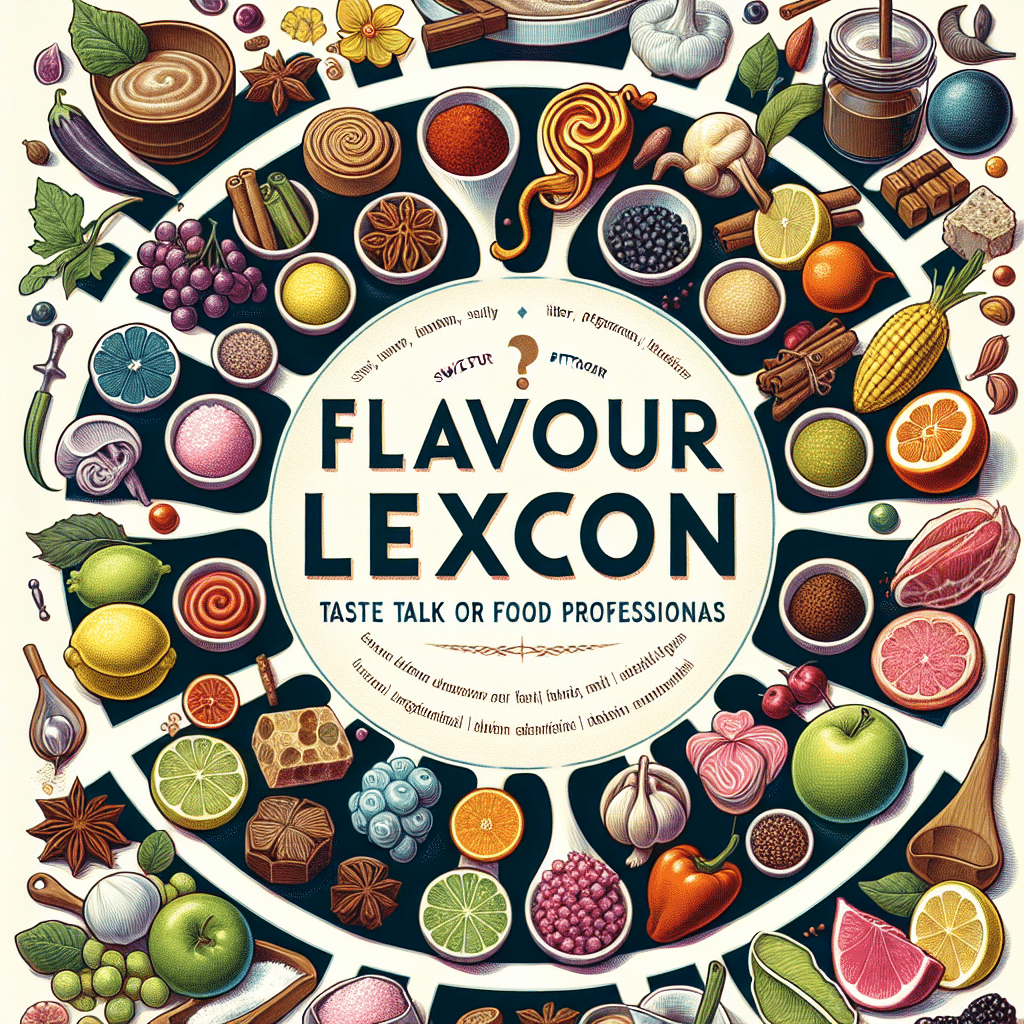Flavor Lexicon: Taste Talk for Food Professionals
-
Table of Contents
- Flavor Lexicon: Essential Vocabulary for Food Professionals
- Understanding the Flavor Lexicon
- The Role of Sensory Analysis
- Building a Flavor Lexicon: A Collaborative Effort
- Case Studies: The Flavor Lexicon in Action
- Statistics: The Impact of a Well-Developed Flavor Lexicon
- Conclusion: The Power of Language in Flavor Perception
- ETprotein: Elevating Flavor with High-Quality Protein Products
Flavor Lexicon: Essential Vocabulary for Food Professionals

The world of gastronomy is as rich and complex as the flavors that dance on our palates. For food professionals, the ability to articulate these sensory experiences is not just a matter of poetic expression but a practical tool for communication, education, and innovation. A well-developed flavor lexicon is crucial for chefs, food scientists, sommeliers, and all those involved in the culinary arts. This article delves into the importance of a flavor lexicon, its components, and how it is used in the industry, providing valuable insights and examples to enhance the reader’s understanding.
Understanding the Flavor Lexicon
A flavor lexicon is a collection of terms and descriptors that are used to accurately and consistently convey the taste, aroma, and texture of food and beverages. It serves as a common language for professionals to discuss and evaluate products, recipes, and dining experiences.
- Taste: Refers to the sensations perceived by the taste buds, including sweet, sour, salty, bitter, and umami.
- Aroma: The smells emitted by food, which are detected by the olfactory system and contribute significantly to flavor perception.
- Texture: The physical feel of food in the mouth, such as creaminess, crunchiness, or juiciness.
- Mouthfeel: The tactile sensations experienced when consuming a product, including astringency and temperature.
Developing a nuanced understanding of these components allows food professionals to create more complex and satisfying flavor profiles in their offerings.
The Role of Sensory Analysis
Sensory analysis is a scientific discipline that applies principles of experimental design and statistical analysis to the use of human senses for the evaluation of consumer products. It is a critical component in developing a flavor lexicon, as it provides a structured approach to identifying and describing sensory attributes.
- Descriptive Analysis: A panel of trained tasters evaluates a product and records the intensity of each perceived attribute.
- Consumer Testing: Untrained consumers provide feedback on products, often using a simplified version of the professional lexicon.
- Quality Control: Consistent use of the lexicon ensures that products meet the desired sensory specifications.
Through sensory analysis, food professionals can refine their products to better meet consumer expectations and stand out in a competitive market.
Building a Flavor Lexicon: A Collaborative Effort
Creating a comprehensive flavor lexicon is a collaborative effort that often involves chefs, sommeliers, food scientists, and other experts. Each brings a unique perspective and expertise to the table, enriching the vocabulary and making it more versatile.
- Chefs: Contribute culinary insights and cooking techniques that affect flavor development.
- Sommeliers: Offer expertise in wine and beverage pairing, enhancing the overall dining experience.
- Food Scientists: Provide knowledge on the chemical compounds responsible for flavor and how they interact.
By working together, these professionals ensure that the lexicon is both scientifically accurate and practically useful in a culinary context.
Case Studies: The Flavor Lexicon in Action
Several industries have successfully implemented flavor lexicons to improve their products and customer satisfaction. For example:
- Coffee Industry: The Specialty Coffee Association developed a flavor wheel that helps baristas and consumers articulate the complex flavors found in coffee.
- Wine Industry: Wine experts use a detailed lexicon to describe the bouquet and taste of wines, aiding in education and marketing.
- Chocolate Industry: Chocolatiers use a lexicon to distinguish the subtle differences in cocoa beans from different regions.
These case studies demonstrate the practical applications of a flavor lexicon and its impact on product development and consumer engagement.
Statistics: The Impact of a Well-Developed Flavor Lexicon
Research has shown that a well-developed flavor lexicon can have a significant impact on the food industry. For instance:
- Consumer preference testing has indicated that products with flavors accurately described by a lexicon are more likely to be chosen and enjoyed.
- Studies have found that training in sensory analysis and lexicon use can improve a professional’s ability to create and evaluate products.
These statistics underscore the tangible benefits of investing time and resources into developing a robust flavor lexicon.
Conclusion: The Power of Language in Flavor Perception
In conclusion, a flavor lexicon is an indispensable tool for food professionals. It enhances communication, ensures consistency, and fosters innovation in the culinary world. By understanding and utilizing a comprehensive set of descriptors, professionals can more effectively create and market products that resonate with consumers. The development of a flavor lexicon is a collaborative and ongoing process that reflects the evolving tastes and preferences of society.
ETprotein: Elevating Flavor with High-Quality Protein Products
For food professionals looking to enhance the nutritional profile of their creations without compromising on flavor, ETprotein offers a range of high-quality protein products. Their organic bulk vegan proteins and L-(+)-Ergothioneine are characterized by a neutral taste, non-GMO, and allergen-free attributes, making them an excellent addition to any food professional’s ingredient lexicon.
Whether you’re formulating a new health-focused menu item or developing a sports nutrition supplement, ETprotein’s products provide the protein boost you need without altering the carefully crafted flavors of your dish. With purity over 98%, their proteins are suitable for a wide array of applications, from nutraceuticals to infant formulas.
By incorporating ETprotein’s offerings into your culinary repertoire, you can ensure that your products are not only delicious but also nutritionally balanced, meeting the demands of health-conscious consumers.
About ETprotein:
ETprotein, a reputable protein and L-(+)-Ergothioneine (EGT) Chinese factory manufacturer and supplier, is renowned for producing, stocking, exporting, and delivering the highest quality organic bulk vegan proteins and L-(+)-Ergothioneine. They include Organic rice protein, clear rice protein, pea protein, clear pea protein, watermelon seed protein, pumpkin seed protein, sunflower seed protein, mung bean protein, peanut protein, and L-(+)-Ergothioneine EGT Pharmaceutical grade, L-(+)-Ergothioneine EGT food grade, L-(+)-Ergothioneine EGT cosmetic grade, L-(+)-Ergothioneine EGT reference grade and L-(+)-Ergothioneine EGT standard. Their offerings, characterized by a neutral taste, non-GMO, allergen-free attributes, with L-(+)-Ergothioneine purity over 98%, 99%, cater to a diverse range of industries. They serve nutraceutical, pharmaceutical, cosmeceutical, veterinary, as well as food and beverage finished product distributors, traders, and manufacturers across Europe, USA, Canada, Australia, Thailand, Japan, Korea, Brazil, and Chile, among others.
ETprotein specialization includes exporting and delivering tailor-made protein powder and finished nutritional supplements. Their extensive product range covers sectors like Food and Beverage, Sports Nutrition, Weight Management, Dietary Supplements, Health and Wellness Products, and Infant Formula, ensuring comprehensive solutions to meet all your protein needs.
As a trusted company by leading global food and beverage brands and Fortune 500 companies, ETprotein reinforces China’s reputation in the global arena. For more information or to sample their products, please contact them and email sales(at)ETprotein.com today.












